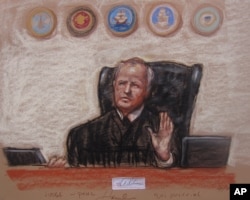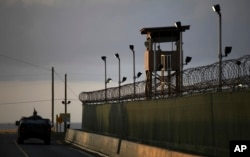Defense lawyers for the five Guantanamo Bay suspects accused of plotting the September 11 terror attacks debated Tuesday how the men could potentially represent themselves, citing security restrictions in their death penalty cases.
A pre-trial hearing stalled on Monday when Walid bin Attash, a Yemeni accused of running an al-Qaida camp in Afghanistan, told his attorneys -- a civilian and a member of the military -- he no longer trusted them and asked the military court how he might represent himself.
The government-appointed attorneys spent about an hour talking to Army Colonel James Pohl, the judge for the proceedings, about how the five terror suspects could defend themselves without access to legal resources and relevant classified materials.
A statement by the Pentagon said the defense argued classified information procedures preclude "the accused's presence during litigation of classified matters."
Pohl proposed a trial conduct order that, based on discussion in court, would divide the functions between the detainee calling himself the lead lawyer and a so-called standby counsel, according to a report in the Miami Herald.
The standby counsel would be a court-approved, American lawyer with a security clearance to see some of the classified evidence available to the defense for trial preparation, the paper reported. The judge did not release the draft order.
'Servant' status
However, David Nevin, attorney for the alleged mastermind of the 9/11 plot, Khalid Sheikh Mohammed, said having lawyers on standby to deal with classified information on behalf of the prisoners would relegate the defendants to “servant” status.
Proceedings had been scheduled to resume Wednesday morning, but a Defense Department statement late Tuesday said the proceedings have been canceled.
"This evening, the military judge canceled in-court proceedings for Wednesday, providing counsel further time to consider and prepare for the advisement he has proposed to give Khallad Bin Attash regarding Bin Attash's right under the Military Commissions Act to represent himself," the statement said.
"The judge will confer with counsel Wednesday morning and court is scheduled to reconvene on Thursday," it added.
A pre-trial hearing stalled on Monday when bin Attash, a Yemeni accused of running an al-Qaida camp in Afghanistan, told his attorneys -- a civilian and a member of the military -- he no longer trusted them. He said he had grown frustrated that they had not been able to resolve long-standing complaints about conditions at Camp 7, a maximum-security section at the U.S. base in Cuba.
He asked the military court how he might represent himself.
Bin Attash is among five people at the hearing accused of plotting the September 11 attacks.
Military prosecutors say bin Attash served as a bodyguard to al-Qaida leader Osama bin Laden, who was killed by U.S. forces during a raid on his Abbottobad, Pakistan, compound in 2011. Bin Attash is also accused of taking part in the USS Cole bombing in October 2000.
"This is a terrible situation and I would counsel anyone against (self-representation)," said James Connell, a lawyer for accused al-Qaida money mover Ammar al Baluchi. "Essentially, pro se representation at Guantanamo is impossible."
A defendant in a military commission trial has a right to serve as his own lawyer but must be informed of the consequences of doing so. Also, the judge in the case must be certain that the choice to do so is voluntary and made in sound mind.
Proposed document
Government lawyers largely agreed with Pohl's proposed document, suggesting only minor changes, according to a Pentagon statement released Tuesday. However, Cheryl Bormann, bin Attash's lawyer, said she needed more time to explain Pohl's proposed advisement to bin Attash.
Almost 3,000 people were killed when hijackers slammed airliners into New York's World Trade Center, the Pentagon and a Pennsylvania field on September 11, 2001.
The five prisoners face terrorism charges as well as nearly 3,000 counts of murder in violation of the laws of war. They could get the death penalty if convicted.
The hearings are held at the Guantanamo Bay U.S. Naval Base prison in Cuba, and are monitored over closed-circuit television at a press room at Fort Meade, outside Washington.
A trial date has not been scheduled.
Carla Babb contributed to this report from the Pentagon. Some material for this report came from Reuters and AP.







